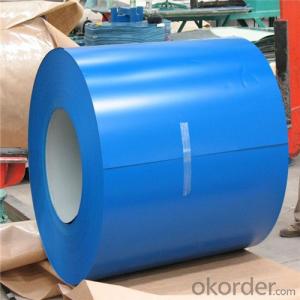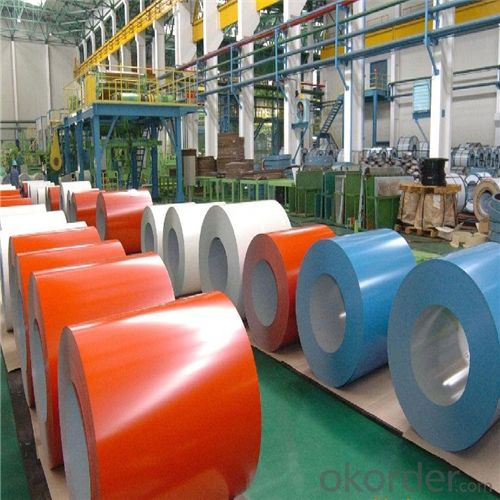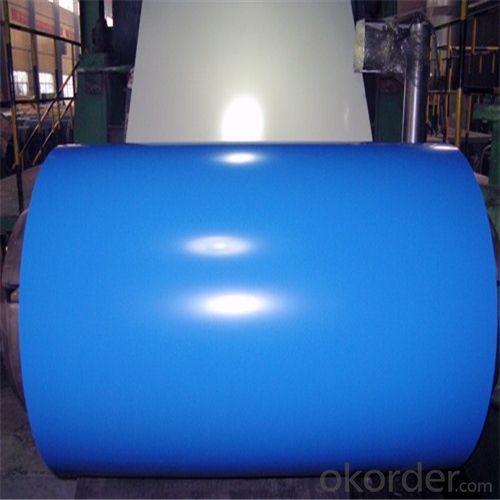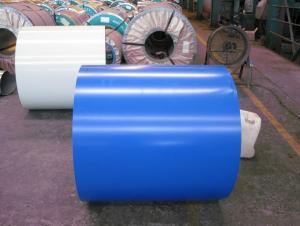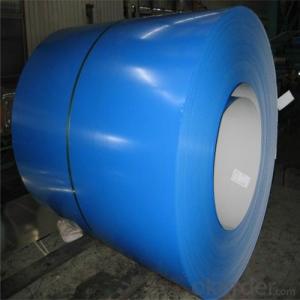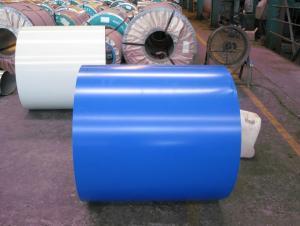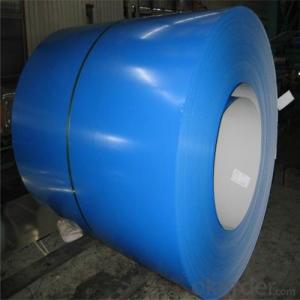Pre-painted Aluzinc Steel Coil Used for Industry with A Best Price
- Loading Port:
- Tianjin
- Payment Terms:
- TT OR LC
- Min Order Qty:
- 25 m.t.
- Supply Capability:
- 8000 m.t./month
OKorder Service Pledge
OKorder Financial Service
You Might Also Like
Pre-painted Aluzinc Steel Coil Used for Industry
1.Structure of Pre-painted Aluzinc Steel Coil Description
With aluzinc steel as base metal, after degrease and chemical treatment and liquid dope with several layers of color, then after firing and cooling, finally the plate steel is called pre-painted aluzinc steel. Pre-painted aluzinc steel is good capable of decoration, molding, corrosion resistance. It generally displays superior workability, durability and weather resistance.
2.Main Features of Pre-painted Aluzinc Steel Coil
•High Purity
•Easy control and operation
•High strength
•Fast melting
•Competitive price
•Best Service
3. Pre-painted Aluzinc Steel Coil Images
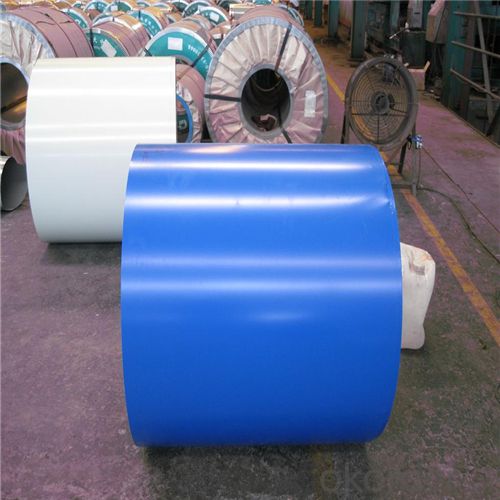
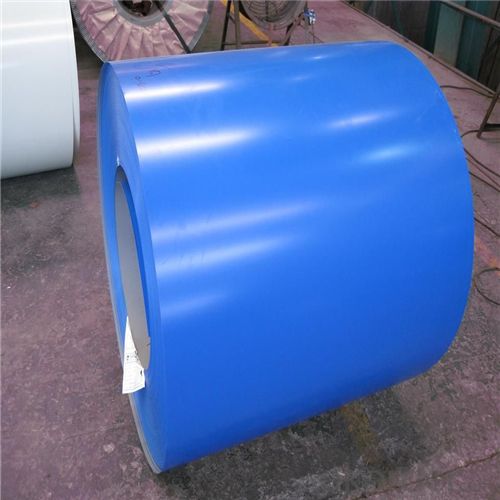
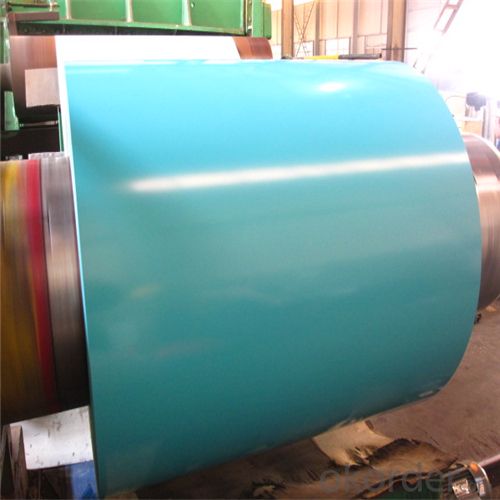
4. Pre-painted Aluzinc Steel Coil Specification
Pre-painted Aluzinc Steel Coil | |
Thicknenss | 0.18mm-1.5mm |
Width | 900-1250mm |
Coating mass | 30-185g/㎡ |
Paint | PE, PVDF, PU |
Color | RAL Scale |
Coil weight | 3-7mt |
Coil inner diameter | 508 or 610mm |
5.FAQ of Pre-painted Aluzinc Steel Coil
We have organized several common questions for our clients,may help you sincerely:
①How about your company?
Annually more than 8000 tons Precision casting and forging parts are exported to markets in Europe,America and Japan. OEM casting and forging service available according to customer’s requirements.
②How to guarantee the quality of the products?
We resolutely put an end to unqualified products flowing into the market. At the same time, we will provide necessary follow-up service assurance.
Sincerely welcome to contact us for the future details if any item interest you ,and we will make every effort to assure that your requirements will be satisfied ,and we hope to establish long-term business relations with you on the basis of the equality and mutual benefit.
We are waiting for your email.
- Q: What are the common applications of stainless steel coils?
- Stainless steel coils possess unique properties and characteristics that allow for a wide range of applications. Some of the most frequently seen uses for stainless steel coils include the following: 1. Automotive industry: The automotive industry extensively incorporates stainless steel coils in the manufacturing of components such as exhaust systems, mufflers, and catalytic converters. These applications benefit from stainless steel's corrosion resistance and durability, making it an ideal choice. 2. Construction industry: The construction industry heavily relies on stainless steel coils for structural elements, roofing, cladding, and facades. Stainless steel's high strength, resistance to corrosion, and aesthetic appeal make it a popular choice for architectural projects. 3. Kitchen appliances: Stainless steel coils are commonly utilized in the production of kitchen appliances like refrigerators, stoves, ovens, and dishwashers. Stainless steel's easy cleanability, resistance to heat and stains, and hygienic properties make it the preferred material for these applications. 4. Food processing industry: The food processing industry widely employs stainless steel coils for equipment such as tanks, pipes, and conveyor systems. Stainless steel's corrosion resistance and ease of cleaning ensure the integrity and hygiene of food products. 5. Medical industry: The medical industry extensively utilizes stainless steel coils for various applications, including medical devices, surgical instruments, and implants. Stainless steel's biocompatibility, strength, and resistance to corrosion make it an ideal material for these critical healthcare applications. 6. Energy sector: Stainless steel coils play a crucial role in the energy sector for applications such as heat exchangers, boilers, and pipelines. Stainless steel's high-temperature resistance, excellent mechanical properties, and corrosion resistance make it suitable for these demanding applications. 7. Chemical industry: The chemical industry employs stainless steel coils for storage tanks, piping systems, and reactors. Stainless steel coils are a reliable choice due to their corrosion resistance and ability to withstand high temperatures and aggressive chemicals when handling various chemical substances. 8. Manufacturing industry: Stainless steel coils find extensive use in various manufacturing processes like stamping, forming, and fabrication. The versatility, durability, and ease of machining of stainless steel make it a popular choice for a wide range of industrial applications. In conclusion, the applications of stainless steel coils are vast and varied, thanks to their exceptional properties such as corrosion resistance, strength, durability, and aesthetic appeal.
- Q: How do steel coils compare to other materials in terms of strength?
- Steel coils are renowned for their remarkable strength and durability, rendering them among the most robust materials obtainable in the market. In comparison to alternative materials like aluminum or plastic, steel coils demonstrate unparalleled strength and resilience against deformation or breakage. Due to the elevated tensile strength of steel, coils can withstand substantial loads, thereby rendering them perfect for diverse industrial uses, encompassing construction, automotive manufacturing, and the production of heavy machinery. Moreover, steel coils possess exceptional fatigue resistance, enabling them to endure repetitive stress and strain without compromising their structural integrity. This strength advantage positions steel coils as the preferred choice for applications that prioritize reliability and safety.
- Q: Hello. No freakin' website has no dam info on what products have carbon steel in them. I know it's in cooking equipment and tools, but what tools?i.e It's in a wrench or strainerSo what products have carbon steel in them?
- there are too many products that have carbon steel in them. just ask yourself whether it rusts, if it does then it has carbon steel. If not then it probably isn't.
- Q: How are steel coils used in the production of electrical appliances?
- Steel coils are used in the production of electrical appliances as the core component for electromagnets. These coils are wound around a metal core and when an electric current passes through them, they create a magnetic field which is essential for the functioning of various electrical components such as motors, transformers, and solenoids.
- Q: I know this is an alloy, but can it be mixed to form a superior steel? Therefore less likely to stain?
- In general, the austenitic stainless steels are considered to have the best overall corrosion resistance of all the stainless steels and to be the most resistant to industrial atmospheres and acid media. As the corrosion conditions become more severe (e.g. higher temperatures and stronger acids), more alloy content above that in type 304 is required. The addition of over 2% Mo to austenitic stainless steels increases resistance to pitting. Type 316 is a popular alloy in this class and contains 2.5% Mo.
- Q: How are steel coils inspected for oil or rust residues using chemical analysis?
- Steel coils can be inspected for oil or rust residues using chemical analysis techniques. One of the commonly used methods is Fourier transform infrared spectroscopy (FTIR). In this technique, a small sample of the steel coil is taken and subjected to infrared radiation. The infrared spectrum obtained is then analyzed to identify the presence of specific chemical bonds that are characteristic of oil or rust residues. For detecting oil residues, a common approach is to use the peak at around 2920 cm-1 in the FTIR spectrum, which corresponds to the C-H stretching vibration in hydrocarbon chains. If this peak is observed, it indicates the presence of oil residues on the steel coil. To identify rust residues, the FTIR spectrum is analyzed for the presence of characteristic peaks corresponding to iron oxide or hydroxide compounds. For example, the presence of a peak at around 560 cm-1 suggests the presence of iron oxide (FeO) or iron hydroxide (Fe(OH)3). In addition to FTIR analysis, other chemical analysis techniques can also be utilized, such as X-ray fluorescence spectroscopy (XRF) or energy-dispersive X-ray spectroscopy (EDX). These techniques can provide elemental composition information, allowing for the identification of specific elements associated with oil or rust residues, such as carbon or iron. Overall, the chemical analysis of steel coils for oil or rust residues provides a reliable and accurate method to ensure the quality and cleanliness of the coils before further processing or usage.
- Q: is stainless steel a good steel for sensitive skin? or does it have to be surgical or sterling silver?
- When I worked at Spencer's the jewelry would usually said what grade/type of metal it was. As long as it says 316L surgical steel you should be ok. But like another person said, go to a professional piercer and buy jewelry there because you know that you're getting good quality. You get what you pay for!
- Q: How are steel coils used in the production of steel knobs?
- Steel coils are used in the production of steel knobs by being uncoiled and fed into a stamping press, where the steel is formed into the desired knob shape. This process allows for efficient mass production of steel knobs with consistent quality and strength.
- Q: I wanted to get a cheapo ring and I found one I like, but it's stainless steel. Is that bad? Will it get dull and tarnished fast?
- a lot of people that do a lot of manual labor with their hands prefer stainless steel because it can withstand potential damage on the job.
- Q: Correct me if I am wrong, but steel is an alloy between iron and carbon. Does the carbon in the steel stops the iron from rusting or corroding? Also what is the difference between mild steel and stainless steel?
- Mild steel is an alloy. It is the most common form of steel. Mild steel (a so-called carbon steel) is a general term for a range of low carbon (a maximum of about 0.3%) steels that have good strength and can be bent, worked or can be welded into an endless variety of shapes for uses from vehicles (like cars and ships) to building materials. The carbon does not stop the material rusting or corroding. In addition to iron, carbon, and chromium, modern stainless steel may also contain other elements, such as nickel, niobium, molybdenum, and titanium. Nickel, molybdenum, niobium, and chromium enhance the corrosion resistance of stainless steel. It is the addition of a minimum of 12% chromium to the steel that makes it resist rust, or stain 'less' than other types of steel. The chromium in the steel combines with oxygen in the atmosphere to form a thin, invisible layer of chrome-containing oxide, called the passive film. The sizes of chromium atoms and their oxides are similar, so they pack neatly together on the surface of the metal, forming a stable layer only a few atoms thick. If the metal is cut or scratched and the passive film is disrupted, more oxide will quickly form and recover the exposed surface, protecting it from oxidative corrosion.
Send your message to us
Pre-painted Aluzinc Steel Coil Used for Industry with A Best Price
- Loading Port:
- Tianjin
- Payment Terms:
- TT OR LC
- Min Order Qty:
- 25 m.t.
- Supply Capability:
- 8000 m.t./month
OKorder Service Pledge
OKorder Financial Service
Similar products
Hot products
Hot Searches
Related keywords
